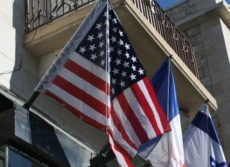The number of antisemitic assaults in the United States in 2019 more than doubled the number of incidents in the year before, part of 1,879 antisemitic attacks in the US last year according to data released by the Anti-Defamation League (ADL). That total, while 5 percent less than 2017, still ranks as the third most attacks in one year since the ADL first began tracking the numbers in 1970.
While the overall numbers are deeply disturbing, the outright violence skyrocketed year-over-year—from 19 antisemitic assaults in 2017 to 39 in 2018, including the murder of 11 people at Pittsburgh’s Tree of Life – Or L’Simcha Congregation in October. The violence impacted 59 victims, almost triple the 21 victims in 2017, noted an ADL press release posted to their website.
“We’ve worked hard to push back against antisemitism, and succeeded in improving hate crime laws, and yet we continue to experience an alarmingly high number of antisemitic acts,” Jonathan Greenblatt, ADL CEO and National Director, was quoted in the press release as saying.
“We unfortunately saw this trend continue into 2019 with the tragic shooting at the Chabad synagogue in Poway. It’s clear we must remain vigilant in working to counter the threat of violent antisemitism and denounce it in all forms, wherever the source and regardless of the political affiliation of its proponents.”
Yuval Rotem, Director General of the Israeli Ministry of Foreign Affairs, took to Twitter to highlight the disturbing year worldwide for antisemitism. “This past year showed an alarming rise in the number of victims of antisemitic attacks. The bitter past teaches that Antisemitism can be translated into physical violence, from the left or the right. This hatred still claims victims in 2019. We must all unite in confronting it,” Rotem tweeted.
The ADL reported that along with the surge in violence in the US came a surge in extremism. The number of attacks associated with extremist groups or persons inspired by extremism reached the highest numbers since 2004, with 249 antisemitic incidents done by such persons, or 13 percent of the total. It wasn’t just done person-to-person either, as antisemitic robocalls by white supremacists harassed dozens of Jewish persons and entities.
Jack McDevitt, Director of the Institute on Race and Justice at Northeastern University, was quoted in the press release as saying, “The increased number of antisemitic incidents tied to extremist groups is deeply troubling and should be addressed immediately by police and prosecutors.”
The geographic scope of the antisemitism was also troubling. Antisemitic attacks occurred in 46 of the 50 US states in 2018, and took place at businesses, homes, schools, Jewish institutions and more.
Israeli President Reuven Rivlin, in a speech for Holocaust Memorial Day on Wednesday published in an Israeli press release, underscored the wide range of growing antisemitism around the world, including in the US with the synagogue shooting at Poway last month.
“From the right and the hard left antisemitism is permeating the heart of European leadership and we see record levels of antisemitic attacks in Britain and in France. A third of Europe’s Jews say they avoid Jewish events for fear of their lives,” said Rivlin.
“There is a dramatic rise in hate crimes against Jews In the United States (and again, just last Shabbat, on the last day of Pesach [Passover]). In eastern and western Europe, we see how racist and antisemitic movements and ideas are coming back to life, even taking their place in parliaments and governments.”
In response, Rivlin believes that Israel can be a voice fighting back against the hate.
“In a world like this, where the power of radical right and left, fundamental Islam and racists and antisemites is rising, I believe that the State of Israel needs to state its case clearly and precisely.”
This includes, he noted, the importance of being clear in how they confront antisemitism and address the Holocaust, even with European allies.
“If we are not clear and precise, how can we expect other nations to take the responsibility and educate their next generations to remember the Holocaust and its lessons?” asked Rivlin, noting he has invited world leaders to a conference in 2020 to mark the 75th anniversary of the liberation of Auschwitz.
He continued, “Together with presidents and heads of state, we will join forces in the uncompromising fight against antisemitism, xenophobia and Holocaust denial.”
(By Joshua Spurlock, www.themideastupdate.com, May 1, 2019)

